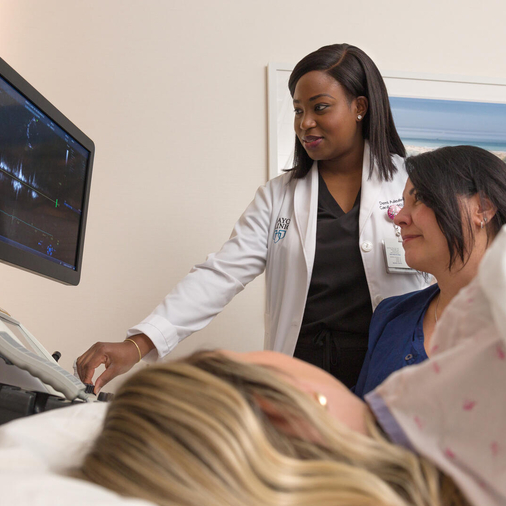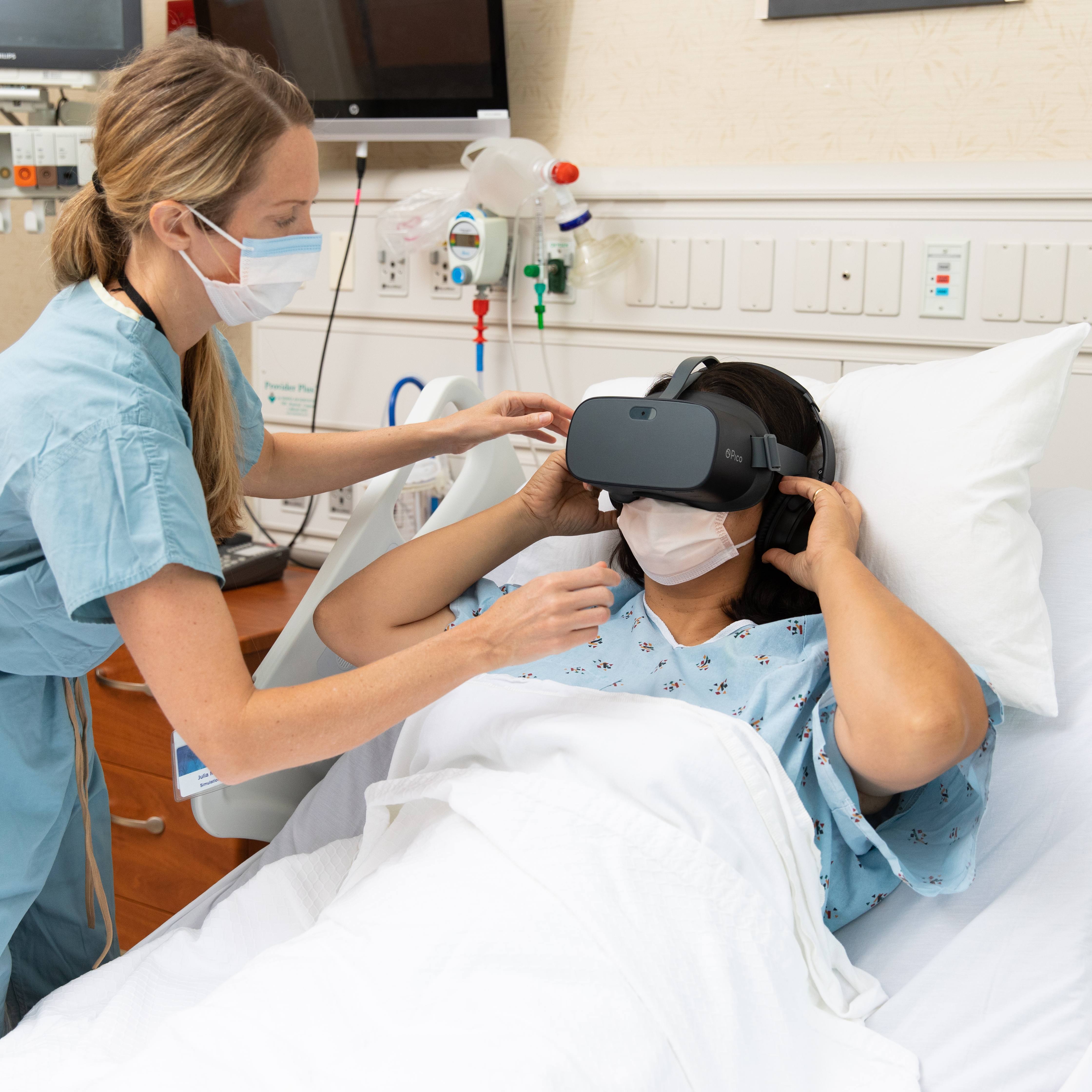-
Science Saturday: Artificial Intelligence won’t replace your doctors, but it could make them better
Artificial intelligence (AI) in medicine is here, and it's advancing at an unprecedented pace. (Raise a bionic hand if you're imagining a robot scooting in to conduct your next checkup.)
In reality, AI is becoming a seamless, behind-the-scenes part of health care, undetected by the patients it serves. Instead, consumers will notice its downstream benefits: faster results, new treatment options, better outcomes and — ironically — a more human experience.
"AI is going to empower health care professionals to delegate some aspects of their job to computers, allowing them to spend more time with patients," says Rickey Carter, Ph.D., a Mayo Clinic biostatistician. "The goal is not to replace clinicians, but to enhance the shared decision-making process between providers and the people they serve."
AI Meets M.D.
In health care, AI is simply a way of programming a computer to process and respond to data for better patient outcomes:
- Scientists feed large amounts of patient data, such as brain scans, into a computer. Central to this step is Mayo Clinic's deep respect for patient permission and privacy.
- The computer is trained by human experts to make associations between data and disease.
- The researchers use the statistical power of the computer to develop rules for how the information is processed, called an algorithm, which can make medical predictions. The AI improves over time as more and more patient data are added.
- Trained providers interpret and incorporate these AI predictions into patient care decisions.
A host of AI-related projects are being developed at Mayo to solve complex medical challenges.
Getting to the Heart of What's Possible for AI
Cardiovascular researchers Paul Friedman, M.D.; Peter Noseworthy, M.D.; Suraj Kapa, M.D.; Francisco Lopez-Jimenez, M.D.; Itzhak Zachi Attia; and colleagues are building new AI tools capable of detecting asymptomatic heart disease.

They've developed an algorithm that interprets EKG signals to detect the presence of a weak heart pump, which can lead to heart failure and death if left undetected, according to Dr. Friedman. Typically, the issue can't be identified by a cardiologist reading an EKG, but the scientists are finding that AI guidance can pick up on subtle features that accurately predict abnormalities.
Dr. Friedman's team also is testing the power of AI-guided EKG to diagnose asymptomatic irregular heartbeat, or atrial fibrillation, which can cause stroke and other significant issues. Its episodes can be brief, making it difficult to capture during a short EKG. AI is capable of finding patterns that are essentially hidden in plain sight to determine whether an arrhythmia recently happened, even if the abnormal rhythm is not present during the time of the brief recording.
"These diseases are treatable — if you can see them," says Dr. Friedman. He compares AI in medicine to using a flashlight when walking at night. "It's going to help us see farther ahead."
Dr. Friedman and colleagues are working to make these tools widely available through technology such as smartphones and high-tech stethoscopes.
And because the success of medical AI hinges on its ability to be integrated into a day-to-day workflow, the tools are being tested in real-world settings. "At Mayo, our unique ability to validate these tools in our own busy clinics will help transform AI from a novelty to a useful medical tool that helps people in practice," says Dr. Friedman.
Computer-Enhanced Cancer Care
"Using math to change the lives of cancer patients is what gets me out of bed every day," says Kristin Swanson, Ph.D., a Mayo Clinic mathematical oncologist.
She and Leland Hu, M.D., a Mayo Clinic neuroradiologist, and their colleagues, are developing individualized approaches to diagnosing and treating glioblastoma, the most common and aggressive type of primary brain cancer. By combining aspects of AI, imaging and precision medicine, the team is working to identify unique drug sensitivities for each patient's tumor. Better yet, the AI algorithms convert routine MRIs into maps that actively track whether different parts of the tumor with different sensitivities are responding as expected.
"This is an advancement in precision medicine, as it takes into account that each tumor is a mixture of different cell populations with different treatment sensitives," says Dr. Swanson. Since glioblastoma is an invasive disease, there are always tumors cells left behind in the brain. These models are capable of diagnosing parts of the tumor that surgical biopsies cannot reach.
Another deadly disease, pancreatic cancer, is also in the flashlight beam of AI. A team led by Michael Wallace, M.D., a Mayo Clinic gastroenterologist, is using AI-enhanced MRI scans to detect the early changes associated with pancreatic cancer. "Early-detection technologies have resulted in dramatic improvements in the prognosis of other types of cancer, but no such model yet exists for pancreatic cancer — and its survival rate is abysmal," he says.

Dr. Wallace and colleagues also are exploring how AI can help detect polyps during colonoscopy. Traditional colonoscopy can reduce the likelihood of colon cancer by about half, but many subtle polyps can be missed by the human eye. "AI has the ability to see subtle changes that signify disease," says Dr. Wallace.
Beyond the Naked Eye (and Ear)
AI tools can tell scientists a lot about what's happening deep within the body, but they're also shining a light on signals closer to the surface.
A team led by Gaurav Pradhan, Ph.D., a Mayo Clinic mathematical and biomedical informatics specialist, is studying how AI-enhanced eye movement tracking can detect mild cognitive impairment, an early sign of more serious cognitive decline. "The eyes are the window to the brain," he says. "There's a lot of evidence that abnormal eye movements, which are too subtle to be observed by providers alone, are connected to neurodegeneration." The ultimate goal of this work is to catch early signs of cognitive impairment and neurological disorders such as Alzheimer's and Parkinson's.

Dr. Pradhan hopes that these tools eventually could be incorporated into
routine checkups. For example, patients in the waiting room could use a
smartphone app or device similar to sunglasses that records their eye movement
data while they complete simple math task.
"In less than two minutes, we can record nearly 200 different eye movement and cognitive features. We're learning how to associate these humungous datasets with disease," he says.
The eyes aren't the only unexpected window to health. Amir Lerman, M.D., a Mayo Clinic cardiovascular researcher, and his colleagues have co-developed an AI tool to diagnose coronary artery disease based on features in a patient's voice.

"It's not something we can hear in plain speech," he explains. Instead, the computer detects subtle segments and frequencies in voice signals. "This tool isn't replacing heart disease screening and follow-up," Dr. Lerman says. "It's increasing the threshold of sensitivity for detection."
Dr. Lerman and colleagues are exploring whether vocal biomarkers also could be useful in screening for lung, gastrointestinal and mental health conditions.
A Picture is Worth a Thousand Data Points
Radiology — the use of images to diagnose and treat people — has been an ideal target for AI's medical applications.
An AI tool has been developed to improve patient care for total knee replacement, with the goal of helping specialists determine which candidates will benefit most. A research team led by Adam Schwartz, M.D., a Mayo Clinic orthopedic surgeon and Kern Health Care Delivery Scholar, and Matthew Neville, a Mayo Clinic statistician, used an enormous image database to teach an algorithm to rate the severity of knee damage. By comparing the accuracy of their AI tool to that of expert knee surgeons, the new tool was found to be precise.
"This has the potential to transform the way we make patient-centered choices to meet their expectations and goals," Dr. Schwartz says.
Bradley Erickson, M.D., Ph.D., a Mayo Clinic neuroradiologist, and his colleagues are developing image-based AI to solve complex issues surrounding brain tumor diagnosis, kidney disease and more. The team has developed an algorithm that could take a CT image of the entire abdomen and pelvis to look for new biomarkers critical to disease.
This group already has deployed a tool to manage polycystic disease into the clinical practice; others for glioma molecular markers and body composition are in the pipeline. As these technologies become ready to translate into practice, Dr. Erickson's team is putting a deliberate strategy in place to help providers implement them effectively.
"Rather than just throwing an algorithm out there, we're slowing down to make sure it operates reliably," he says. For example, his team is working with health care professionals on how to reconcile circumstances in which the algorithm and provider disagree, which in turn will help improve the AI tools. He notes that Mayo physicians are accustomed to sharing information to maximize patient care, which lends itself well to the challenges and opportunities of AI.
Ethics and Optimism
As with any new technology, carelessness in implementing medical AI could create risks. The pace and scope of innovation in this realm are generating ethical considerations for researchers and providers.
One area of concern is bias within the data used to create algorithms, which could lead to inherent bias in its outcomes. "Diverse patient populations are needed to fill AI datasets. The algorithms need to be useful for everyone," says Richard Sharp, Ph.D., a Mayo Clinic biomedical ethicist. There is also unease related to shared decision-making, data transparency, determining when an algorithm is ready for the clinic, patient privacy and more.

"Patients are worried about sharing their personal data. And they're worried that AI could widen the distance from physicians they already feel," says Dr. Sharp. "Even if these concerns aren't likely to materialize, public perception and worry could shut down an emerging area of medicine like this."
To this end, he emphasizes the need to include patients during all stages of AI development.
"We're gearing up to learn more about their concerns," Dr. Sharp says. "At Mayo, patients are central to all we do. They will shape how we're implementing AI."
It's Mayo's patient-first values that lead Dr. Sharp to feel optimistic about the power of AI in medicine. "Mayo Clinic practitioners follow foundational ethical commitments to the patients in their care," he says. "These provide a strong bedrock so that even a technology that's amenable to misuse is channeled in ways that are positive for the patients and communities we serve."
— Sara Nick







